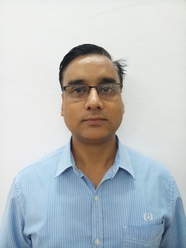About Department

Dr. Rajeev Singh
Head
Department of Information Technology
The Department of Information Technology came into existence on 7th, December, 2010 after bifurcation of Computer engineering department. The B. Tech. (Information Technology) programme started in the year 2001 under Computer Engineering Department. The Master of Computer Applications (Self Finance) programme started in the year 2007 as an independent unit under College of Technology. Now both the programmes are running under IT department with the order of the board of management. Within a year department has started M. Tech. (I.T.) programme from July, 2011 And Ph. D programme has started from 2018-19 academic year.
The Department imparts training in the area of Computer Networks, Network Security, Software Engineering, Mobile Computing, Database Management Systems, Information Security, Web Designing, Bioinformatics and many ICT related fields. The faculty members are conducting research work in these areas. The UG and PG students are encouraged to take-up projects in the above mentioned fields. Student in information Technology get the real time hands on experience of working with various platform of operating system like windows, Linux and Macintosh. Department has a laboratory all in one Apple Computer where students can take an advantage of working with Macintosh operating System. The course curriculum of the Department is regularly updated from time to time in order to cope up with the upcoming demands of the industry and recent Information Technology developments.
PROGRAM OUTCOMES (PO's)
A graduate of the Information Technology Program will demonstrate:-PO-I : Engineering knowledge: Apply the knowledge of mathematics, science, engineering fundamentals, practical industrial knowledge and engineering specialization to the solution of practical and industry oriented engineering problems.
PO-II: Problem analysis: Identify, formulate and analyze engineering problems reaching substantiated conclusions using first principles of mathematics, natural sciences, engineering and technology.
PO-III: Design/development of solutions: Design solutions of engineering problems and development of system components or processes that meet the specified needs with appropriate consideration for the public health and safety, cultural, societal, and environmental considerations.
PO-IV: Modern tool usage: Create, select, and apply appropriate techniques, resources, modern engineering and IT tools to complex engineering activities with an understanding of the limitations.
PO-V: The engineer and society: Apply reasoning informed by the contextual knowledge to assess societal, health, safety, legal and cultural issues and the consequent responsibilities relevant to the professional engineering practice.
PO-VI: Environment and sustainability: Understand the impact of the professional engineering solutions in societal and environmental contexts, and demonstrate the need for development of sustainable solution.
PO-VII: Ethics: Apply ethical principles and commit to professional ethics and responsibilities and norms of the engineering practice
PO-VIII: Team work and Communication: Function effectively as a member or leader in diverse teams, and in multidisciplinary roles. Communicate effectively on engineering activities with the engineering community, such as, being able to comprehend and write effective reports and design documentation, make effective presentations.
PO-IX: Project management: Demonstrate knowledge and understanding of the engineering and management principles and apply these to one’s own work.
PO-X: Continuous learning: Recognize the need for, have the preparation and ability to demonstrate continuous learning in the context of technological change.
PROGRAM SPECIFIC OUTCOMES (PSO's)
A graduate of the Information Technology Program will demonstrate:-PSO I : Professional Skills: The ability to understand, analyze and develop computer programs in the areas related to algorithms, system software, multimedia, web design, big data analytics, and networking for efficient design of computer-based systems of varying complexity.
PSO II : Problem-Solving Skills: The ability to apply standard practices and strategies in software project development using open-ended programming environments to deliver a quality product for business success.
PSO III : Successful Career and Entrepreneurship: The ability to employ modern computer languages, environments, and platforms in creating innovative career paths to be an entrepreneur, and a zest for higher studies.
PROGRAM EDUCATIONAL OBJECTIVES (PEO's)
A graduate of the Information Technology Program should:Program Educational Objective - I : Students will establish themselves as effective professionals by solving real problems through the use of computer science knowledge and with attention to team work, effective communication, critical thinking and problem solving skills.
Program Educational Objective - II : Students will develop professional skills that prepare them for immediate employment and for life-long learning in advanced areas of computer science and related fields.
Program Educational Objective - III : Students will demonstrate their ability to adapt to a rapidly changing environment by having learned and applied new skills and new technologies.
Program Educational Objective - IV : Students will be provided with an educational foundation that prepares them for excellence, leadership roles along diverse career paths with encouragement to professional ethics and active participation needed for a successful career.